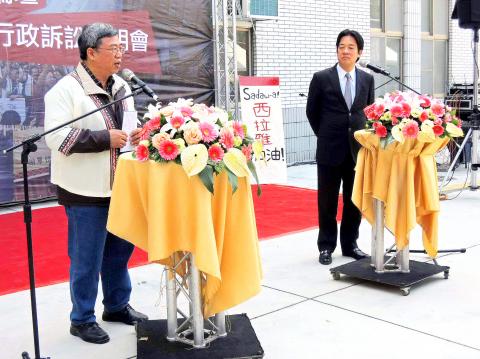The Siraya people are to file an administrative suit with the High Administrative Court regarding their official indigenous status, and will be accompanied by Tainan Mayor William Lai (賴清德).
The Greater Tainan City Government has been helping the group “right their name” and regain their indigenous status, holding a forum on the recognition of the group and an information meeting about the administrative lawsuit at the Tainan Siraya Cultural Hall yesterday, in which the Siraya people announced a recognition declaration and academics made speeches.
Lai said the Siraya people are “Taiwanese plains Aborigines,” who had been recognized by the former Tainan County Government as a “county-recognized indigenous group,” and have continued to be acknowledged by the special municipality as a “city-recognized indigenous group” after the merger of Tainan County and Tainan City.

Photo: Lin Meng-ting, Taipei Times
However, the Siraya people have not been officially recognized on a national level, Lai said.
“People without human rights are as if they have no souls,” Siraya Cultural Association head Wan Cheng-hsiung (萬正雄) said.
The Siraya people have been living on this land for more than 400 years, but the Sirayan culture has been repressed and destroyed by a series of foreign regimes, Wan said, adding that the Siraya people were hoping to achieve “historical justice” and secure their human rights through the recognition movement.
Tainan Ethnic Affairs Commission (EAC) director Wang Chi-min (汪志敏) said the recognition of a person’s identity is a natural right that they cannot be deprived of.
By making great efforts and progress on cultural restoration, including the preservation of the group’s music and traditional rituals, and the reconstruction of tribes, the Siraya people have rebuilt their self-identity, Wang said.
However, petitioning attempts in recent years to urge the government to have the Siraya people officially listed as one of the nation’s recognized Aboriginal groups have been repeatedly rejected by the Executive Yuan, EAC Preparation Committee of the Siraya People Affairs executive secretary Wan Shu-chuan (萬淑娟) said.
Appeals lodged against the decisions have also been turned down, she added.
The recognition movement has now entered the judicial stage and the Siraya people plan to arrive in Taipei on Wednesday to file an administrative lawsuit with the High Administrative Court.
Saying that he would be accompanying the group to Taipei, Lai expressed his hope that the case could be resolved during his term, adding that bringing the case to the Constitutional Court, if needed, is an option.
Additional reporting by CNA

POLAM KOPITIAM CASE: Of the two people still in hospital, one has undergone a liver transplant and is improving, while the other is being evaluated for a liver transplant A fourth person has died from bongkrek acid poisoning linked to the Polam Kopitiam (寶林茶室) restaurant in Taipei’s Far Eastern Sogo Xinyi A13 Department Store, the Ministry of Health and Welfare said yesterday, as two other people remain seriously ill in hospital. The first death was reported on March 24. The man had been 39 years old and had eaten at the restaurant on March 22. As more cases of suspected food poisoning involving people who had eaten at the restaurant were reported by hospitals on March 26, the ministry and the Taipei Department of Health launched an investigation. The Food and

A fourth person has died in a food poisoning outbreak linked to the Xinyi (信義) branch of Malaysian restaurant chain Polam Kopitiam (寶林茶室) in Taipei, Deputy Minister of Health and Welfare Victor Wang (王必勝) said on Monday. It was the second fatality in three days, after another was announced on Saturday. The 40-year-old woman experienced multiple organ failure in the early hours on Monday, and the family decided not to undergo emergency resuscitation, Wang said. She initially showed signs of improvement after seeking medical treatment for nausea, vomiting and diarrhea, but her condition worsened due to an infection, he said. Two others who

The long-awaited Taichung aquarium is expected to open next year after more than a decade of development. The building in Cingshui District (清水) is to feature a large ocean aquarium on the first floor, coral display area on the second floor, a jellyfish tank and Dajia River (大甲溪) basin display on the third, a river estuary display and restaurant on the fourth, and a cafe and garden on the fifth. As it is near Wuci Fishing Port (梧棲漁港), many are expecting the opening of the aquarium to bring more tourism to the harbor. Speaking at the city council on Monday, Taichung City Councilor

Taiwanese should be mindful when visiting China, as Beijing in July is likely to tighten the implementation of policies on national security following the introduction of two regulations, a researcher said on Saturday. China on Friday unveiled the regulations governing the law enforcement and judicial activities of national security agencies. They would help crack down on “illegal” and “criminal” activities that Beijing considers to be endangering national security, according to reports by China’s state media. The definition of what constitutes a national security threat in China is vague, Taiwan Thinktank researcher Wu Se-chih (吳瑟致) said. The two procedural regulations are to provide Chinese